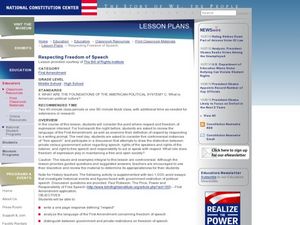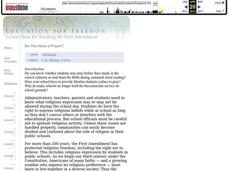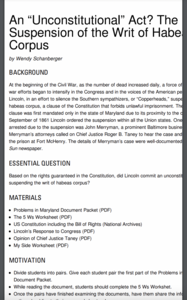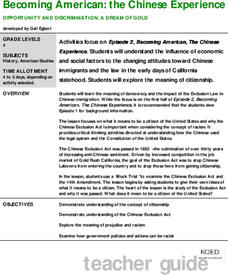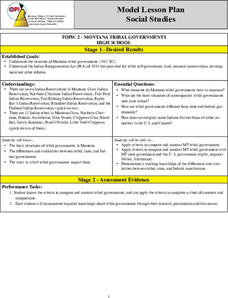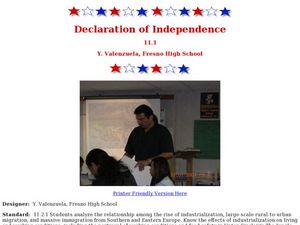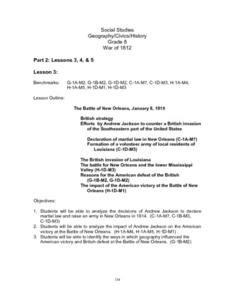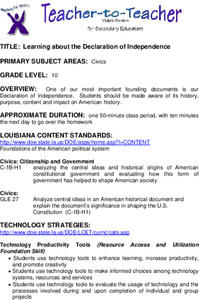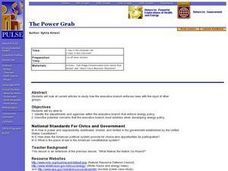Curated OER
Which form of government?
Eleventh graders examine different forms of government. In this American Government lesson, 11th graders research a different government. Students create a poster board on the type of government.
Curated OER
Respecting Freedom of Speech
Learners analyze the First Amendment. In this Bill of Rights lesson, students listen to their instructor present a lecture regarding the facets of the First Amendment. Learners examine cases which pertain to the freedoms that the...
Curated OER
Texas v. Johnson
Students examine the freedom of speech. In this Supreme Court lesson, students analyze primary documents from Texas v. Johnson and discuss the implications of the decision regarding flag burning.
Curated OER
Do You Have a Prayer?
Students review the 1st Amendment and the clauses which deal with prayer/religion in schools. They discuss, in groups, the Equal Access Act, which gives students the right to practice/express their religion at school and take a quiz on...
Curated OER
The Rights of the Child
Students create a set of rights that promote safety and tolerance at the school site. For this Bill of Rights lesson, students read the U.N. Declaration on Rights of the Child. Student presenters lead a discussion of these rights and...
Curated OER
The Pledge of Allegiance
Learners study the history of the Pledge of Allegiance. They investigate the First Amendment concept of separation of Church and state using Internet resources.
Curated OER
Perseverance and the First Amendment
Students investigate the right to petition and assemble. In this Bill of Rights instructional activity, students read the First Amendment and discuss the rights guaranteed by the amendment. Students research selected groups and movements...
Curated OER
The European Union
Middle schoolers compare the structures and content of the United States Constitution against the draft of the European Union Constitution. They consider various perspectives on the formation of a constitution.
Curated OER
Memorandum of a Conference with President Eisenhower after Sputnik
Students document and list excerpts from a document that shows how calmly officials reacted to the launching of Sputnik. They research contemporary magazines and newspaper articles of the day as well.
Curated OER
Solving a Community Problem Through Education
Fourth graders examine and compare Indian and American culture in order to develop a better understanding of both.
Curated OER
The Ratification Debate
Eighth graders investigate the debate in order to understand the Ratification in context of the period of history being studied. They read text answer questions through identifying the differences between Federalists and Antifederalists.
Curated OER
An "Unconstitutional" Act? The Suspension of the Writ of Habeas Corpus
Young scholars explore the implications of habeas corpus. In this Civil War lesson, students analyze the writ of habeas corpus by Lincoln during the war. Young scholars examine primary sources from Lincoln and Chief Justice Taney....
Curated OER
Opportunity and Discrimination, A Dream of Gold
Students focus on what it means to be a citizen of the United States and why the Chinese Exclusion Act is important when considering the concept of racism.
Curated OER
Dr. Fix-It Subjects: Health, Government
Help your students undertand the critical problems around healthcare. By focusing on the political and private process of healthcare, students will watch a video, analyze issues, and write an essay on their findings. Additionally, they...
Curated OER
Montana Tribal Governments
Students engage in a research lesson plan to find out more information about tribal governments. The lesson plan includes guiding questions to help in the research process. They complete a chart of comparisons and contrasts of several...
Curated OER
Declaration of Independence
Twelfth graders summarize sections of the Declaration of Independence and share their interpretations with classmates. They write essays on the Declaration or an essay tracing the rights of minorities from the Revolution to the present.
Curated OER
War of 1812
Eighth graders locate the major land forms and bodies of water on a map of Louisiana. In groups, they discuss the role of the Mississippi River in the Battle of New Orleans and how land and water affect the outcome of battles. To end...
Curated OER
declaration of Independence
Tenth graders research the Declaration of Independence and its impact. They assemble puzzle pieces of the declaration and create their own declaration of independence including grievances and resolution.
Curated OER
Mock Trial
Learners rewrite a traditional fairy tale to represent the viewpoint of the villain. They participate in a mock trial of that villain in which all regular court participants (judge, jury, defendant, witnesses, plaintiff, etc) play roles.
Curated OER
A Lesson To Accompany "The First Bank of the United States: A Chapter in the History of Central Banking"
Here is an interesting topic. Learners examine the economics that led to the founding of the First Bank of America. They participate in a reader's theater experience depicting the debate between Alexander Hamilton and Thomas Jefferson...
Curated OER
The Embodied Presidency
Tenth graders compare and contrast the immigration reform policies of Presidents Reagan and Bush. In this immigration lesson, 10th graders examine primary documents related to each president's policy for immigration reform. Students...
National Constitution Center
Fourth of July (Grades 9-12)
Class members work to translate the Declaration of Independence into their own words, as well as design a Facebook page within the context of 1776 to raise public awareness about the document and its meaning for citizens.
Curated OER
Hypothetical Heights
High schoolers participate in an interdisciplinary lesson to discuss improvements that would make them want to return to a previously poor neighborhood. In this civics lesson, students work in a budget to make a plan to better their...
Curated OER
Government: The Power Grab
Students are able to identify the departments and agencies within the executive branch that enforce energy policy. They are able to describe potential concerns that the executive branch must address when developing energy policy.



